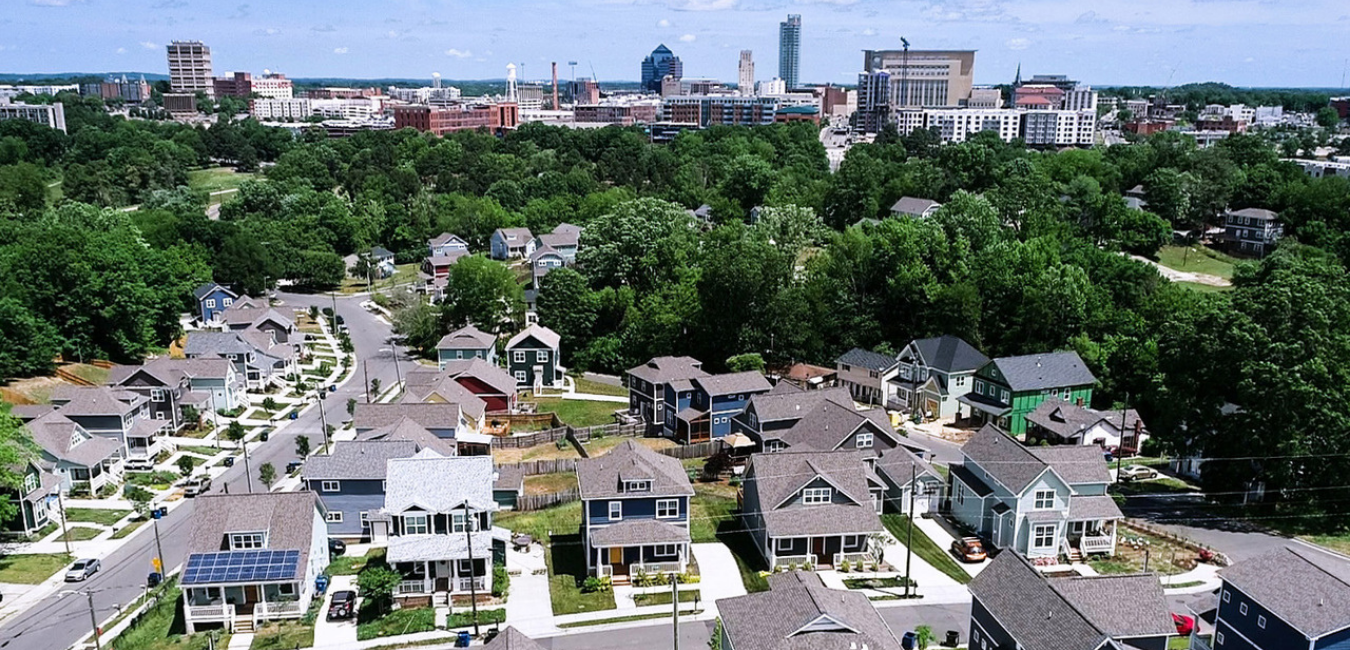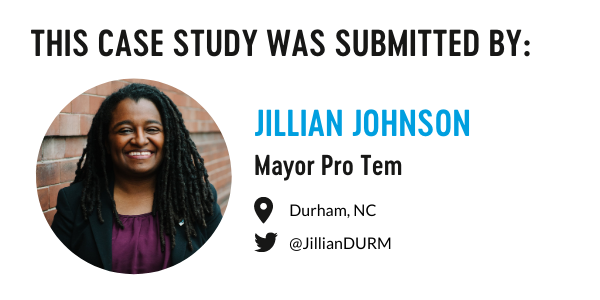Planning for Housing Affordability and Neighborhood Diversity
Durham, NC
Population: 100,000-500,000 | Government type: City | Topic: Affordable Housing
The POLICY
The City of Durham expects to add, conservatively, 10,000 people to the city’s population each year for at least the next five years. Data from 2016 shows that 42% percent of renters and 15% of homeowners are housing cost-burdened, and both rents and home prices are continuing to rise. The city housing stock breakdown is five percent public housing, 90+ percent market, and the rest affordable at various area median indexes (AMIs).
In response to the worsening affordability crisis, Durham developed a five-year $160 million spending plan with three priorities for housing investments: (1) strengthening the homeless housing system, (2) creating more multi-family rental housing, and (3) stabilizing existing neighborhoods. Specific efforts include increasing opportunities for homeownership through down-payment assistance; partnering with the Durham Housing Authority to build more affordable rental housing; investing in rapid rehousing and centralized intake for homeless services; and providing repair and maintenance assistance to low-income homeowners.
The Durham Housing Authority (DHA) is a key partner in the city’s redevelopment efforts. DHA owns land throughout the city and owns a significant amount of valuable downtown land which was purchased after redlining and white flight from the city had greatly devalued center-city real estate. The city and DHA are focused on repairing past harm and developing inclusive housing strategies. They plan to create mixed-use developments with mixed-income housing, using higher downtown market rents to subsidize public and affordable units. This plan will also provide commercial space to rent at market rates—or at subsidized rates for targeted business enterprises—as well as providing jobs and workforce development and training opportunities to public housing residents. $65M of funding will be provided to DHA over the next five years to support this $500M project. The program is already being implemented, with the redevelopment of JJ Henderson Senior Housing and tax credit applications pending for a complete redevelopment of Liberty Street Apartments. The driving vision is for housing affordability and neighborhood diversity across the city.
In November 2019, residents approved a bond that makes up $95 million of the total $160 million spending plan. Other local funding comes from a two-cent housing trust fund tax levy that generates up to $6 million per year, federal entitlement funding, and private sources such as local developers and Duke University. Federal funding sources include Community Development Block Grants (CDBG), HOME, and HOPWA (for residents with AIDS).
Other key partners for the City of Durham include community-based organizations like Urban Ministries, Housing for New Hope, the Durham Community Land Trustees, CASA, Habitat for Humanity, and others. These partners provide homelessness services including emergency shelter and rapid rehousing, permanent supportive housing, affordable rental housing, and homeownership opportunities. The additional funding in the five-year housing plan means more support goes to these organizations, along with a homeless coordinated entry system in partnership with the county.
Collaborative Governance
The Mayor and community development staff were the initial creators of the city’s five-year affordable housing plan and calculated the total necessary funding along with the funding gap of $95 million. A community coalition was convened by the mayor to discuss both the overall housing plan and bond proposal and offer ongoing revisions based on community feedback. After a round of revisions with staff, the city council approved the plan, and the bond measure was put on the ballot for the Fall 2019 municipal election.
The community coalition, along with various industry representatives, spoke up in strong support of the housing bond during the election. Rather than fundraise for his own reelection, the Mayor raised money to support the bond coalition committee. This committee met with community organizations to get their endorsements and secure PAC support. The bond was endorsed by the two most prominent political PACs in the city as well as former elected officials, the Chamber of Commerce, and local labor unions. The bond ultimately passed with over 70 percent of the vote, a strong public mandate for the city’s affordable housing vision.
Moving forward, the mayor convened a community leadership body, internal to the city, to oversee the implementation of the housing plan. The city plans to evaluate the program in five years to assess continued funding needs for the building and rehabilitation of affordable housing.
Emphasis on equity
The Durham housing plan focuses on preserving and supporting more diverse communities in its approach to housing investments. For example, they are rebuilding public housing without concentrating the units and isolating low-income residents in high-poverty neighborhoods. The city is also working with affordable housing partners to develop proposals that ensure a mix of housing types for different AMIs and place retail in appropriate locations throughout the downtown.
The public vote on the housing bond shifted power to residents. The strong support for this program demonstrated that voters are committed to ensuring Durham remains accessible and affordable to all residents. The bond is also a form of wealth distribution, taxing the population at a flat rate and subsidizing housing affordability for low-income residents. While the city has full authority to tax at a flat rate, it cannot pass higher taxes on different types of property, higher-income people, or higher-value property under state law. If the city had more authority it could, for example, pass a bond to levy an additional tax only on the most wealthy residents or most valuable properties.
Analysis
Preemption: The North Carolina General Assembly has a significant history of preempting its localities, and NC is a Dillon’s Rule state. According to the state constitution, localities can only levy property taxes at a flat rate. Changing this would require a constitutional amendment. Localities also cannot do inclusionary zoning or rent control, so their housing policy authority is relatively limited.
Local government dynamics: A strong majority of the council supported the plan. The vote on authorizing the bond referendum was 6-1.
Policy impact: Given the preemption of local regulation of housing market conditions, cities in states like NC must rely on robust partnerships with private affordable housing developers and significant public funding to improve housing affordability. This makes development more difficult and more expensive, but it can also give the city an additional measure of control over where affordable units are built and what amenities are built with them. Durham’s plan will allow the city to move beyond the traditional public housing model to create a more diverse portfolio of publicly-owned and publicly-subsidized affordable housing across the city’s neighborhoods. The housing bond referendum as a funding mechanism also gave housing advocates an opportunity to work with city officials to move an ambitious plan forward, leading to strong and continuing community engagement.
Last updated: January 19, 2021
If you’re interested in learning more, please contact info@localprogress.org













